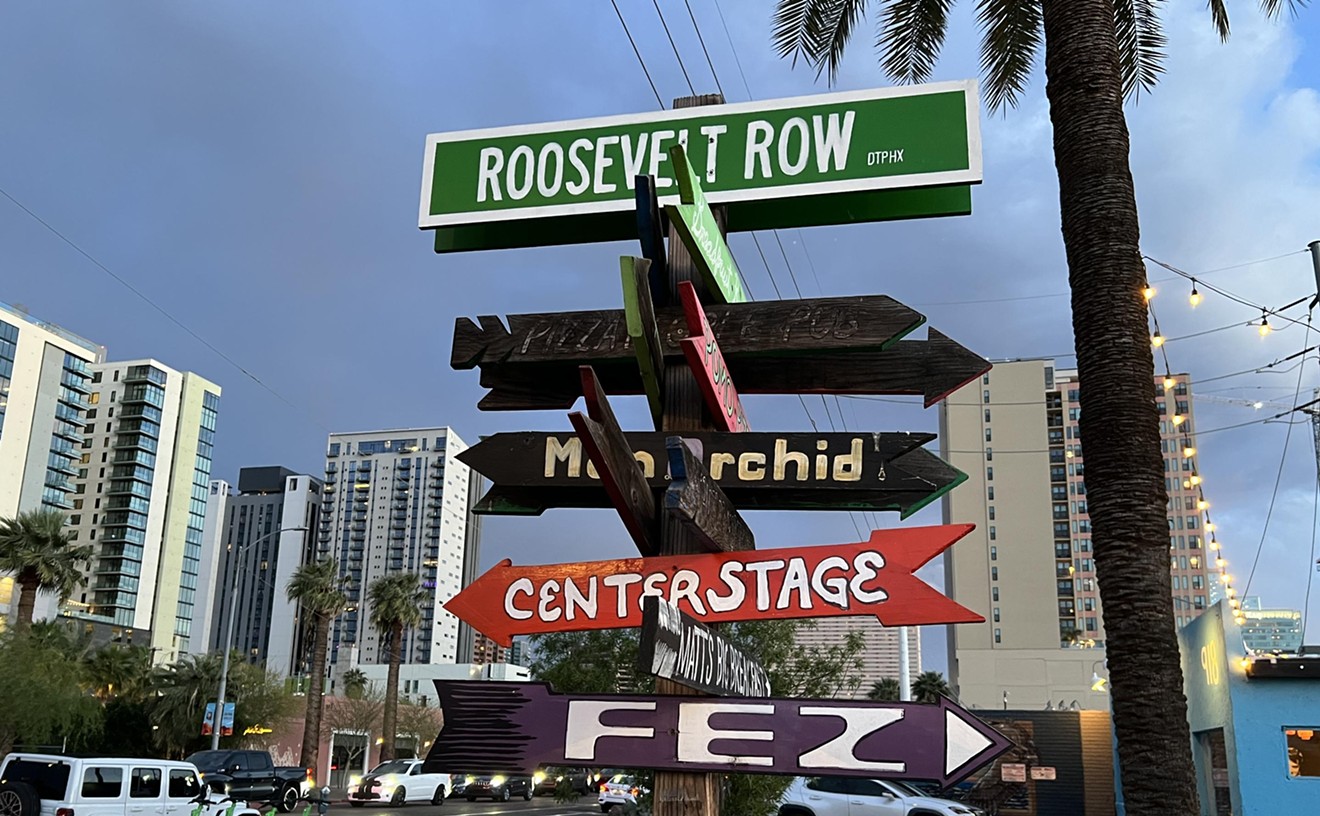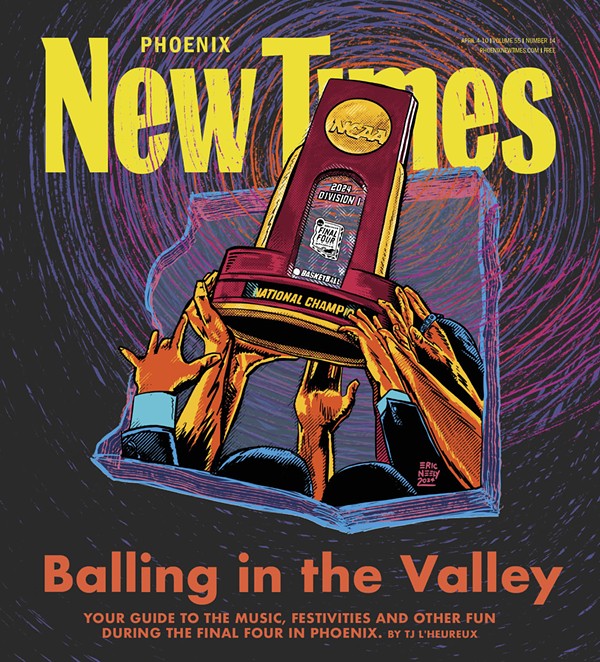How Being Mistaken for Mexican Exposed My White Privilege
Robrt Pela recently wrote about why Phoenix feels so white, despite its racial diversity. Here, he reflects on his experiences with whiteness, brownness, and what they mean in a place bordering Mexico. It’s August 28, 1976, my first day of high school. Mrs. Travis, our over-effusive third-period algebra instructor, has...
October 4, 2016
[
{
"name": "Air - MediumRectangle - Inline Content - Mobile Display Size",
"component": "18478561",
"insertPoint": "2",
"requiredCountToDisplay": "2"
},{
"name": "Editor Picks",
"component": "16759093",
"insertPoint": "4",
"requiredCountToDisplay": "1"
},{
"name": "Inline Links",
"component": "17980324",
"insertPoint": "8th",
"startingPoint": 8,
"requiredCountToDisplay": "7",
"maxInsertions": 25
},{
"name": "Air - MediumRectangle - Combo - Inline Content",
"component": "16759092",
"insertPoint": "8th",
"startingPoint": 8,
"requiredCountToDisplay": "7",
"maxInsertions": 25
},{
"name": "Inline Links",
"component": "17980324",
"insertPoint": "8th",
"startingPoint": 12,
"requiredCountToDisplay": "11",
"maxInsertions": 24
},{
"name": "Air - Leaderboard Tower - Combo - Inline Content",
"component": "16759094",
"insertPoint": "8th",
"startingPoint": 12,
"requiredCountToDisplay": "11",
"maxInsertions": 24
}
]
Robrt Pela recently wrote about why Phoenix feels so white, despite its racial diversity. Here, he reflects on his experiences with whiteness, brownness, and what they mean in a place bordering Mexico.
It’s August 28, 1976, my first day of high school. Mrs. Travis, our over-effusive third-period algebra instructor, has just wrapped up a speech about how much we’re going to love our “adventure at Apollo High,” and now she’s taking roll. Although a lot of the kids at Apollo are Mexican-American, there aren’t any brown kids in advanced algebra.
Except, it would appear, me. When she gets to my name, Mrs. Travis pronounces it “Hhrrrrrow-brrrr Pay-ah!” Bits of enthusiastic spittle fly from her noisily rolled Rs. I stare at her, not sure if she’s kidding. I am 14, and convinced that all adults are laughing at me.
“Who, me?” is all I can manage.
“Por qué no hablas Español?” she demands. “No sea tímido!”
The only Spanish I know is the words to “Lo Siento Mi Vida,” my favorite Linda Ronstadt song.
“I don’t know what you’re saying,” I tell Mrs. Travis, who responds with a big wink.
After class, she follows me out into the hall. “Your family doesn’t speak Spanish at home?” she asks.
“No,” I tell her. “They speak English. Sometimes my father swears in Italian. I’m Italian-American.”
Now it’s Mrs. Travis’ turn to stare. She gives me the once-over: black hair, brown eyes, auburn skin, courtesy of Coppertone mixed with brown Rit dye, my own invention.
“I’m Italian,” I explain. “I spent a lot of time in the sun this summer.”
She smiles wide and winks again. “Oh, okay,” she says, with an exaggerated nod. “Well, let’s make you an honorary Mexican, then."
***
I figured it out pretty early: Being thought of as Chicano had less to do with small-mindedness than it did with geography. I grew up just blocks from Glendale, I was dark, I attended a largely Hispanic high school. I must be Mexican! As Phoenix began to fill up with more and more brown people from all over, I got used to being mistaken for all kinds of Latino. My husband, when we were first dating nearly 20 years ago, figured I was Hispanic.
When he and I began spending in summers in France, I was reminded of the whole mistaken-race thing. Eighteen hours of air travel transformed me into an American, period. Here, everyone wants to know what kind of American hyphenate you are. Filipino-American? Guatemalan-American? In our small Provencal village, no one cared. The French people I got to know were surprised to learn that I considered myself an Italian-American. “We just thought Americans were American,” I was told more than once.
I became even less Italian in, of all places, Italy.
“Why is everyone speaking French to me?” I whined to my husband the first time we visited Ventimiglia, an Italian merchant village just beyond the French-Italian border. “Don’t they recognize a compagno?”
“Why do you care?” he asked. “If they spoke Italian to you, you wouldn’t understand them.”
Geography, again. An hour’s drive over the border into Italy and I, an Italian-American, had become French.
***
It’s my nephew’s 40th birthday. I’ve invited him and his family to my parents’ home for a celebratory dinner. During dessert — the same red velvet cake I baked for his first birthday, in this very house — his wife, a tall, Nordic blonde, is telling us about how a stranger recently charged a bunch of stuff to her credit card.
“It’s the illegals,” she says, shaking her beautiful blonde head. “It’s not enough that they’re sneaking in, stealing our jobs,” my niece-in-law explains. “Now they have to steal our identities, too.”
I glance from her to her husband, then to his mother, seated at his left. Both are very busy eating cake. I peek at the couple’s children. “But your husband is half Mexican,” I say quietly. “Your kids are a quarter Mexican.” I am hosting this party, thrown in the house where I was raised to believe in equality. Racism isn’t on the menu.
“They’re not illegal,” she calmly informs me. “They’re Americans, born in Phoenix.” Dessert forks scrape bone china. My father clears his throat. My former sister-in-law — who long ago enlightened our family about the difference between Spanish and Mexican, again in this very house, who taught my mother to make tamales and menudo, who gracefully introduced us to the true Southwestern culture of Arizona, where we’d recently moved from Ohio — doesn’t appear to have heard.
***
Being ashamed of your heritage was something I understood. The small Ohio town where my parents and I were born was populated mostly by Italian immigrants. As in any small, ethnic community, there was a class system there. The Sicilians were invisible; they didn’t even count as real Italians. The Bagnolese were inferior, because they’d come from Bagnoli Irpino, a rustic mountain village in the south. The Bagnolese were, I suppose, the Italian equivalent of hillbillies. Many of them claimed to be from Bagnoli, a seaside mill town near Bagnoli Irpino.
As a kid obsessed with old movies, I was thrilled to learn that Hollywood’s Warner brothers had gotten their start in that same Ohio town my family hailed from. Before they were the Warner Bros. and movie royalty, they owned a nickelodeon in Niles, Ohio. My grandfather worked for them.
“Back then, they were still Jews,” Grandpa explained to me one day in the mid-1970s. The Warner boys hadn’t converted to Christianity; they and numerous other Tinseltown titans like Louis B. Mayer and Adolph Zukor had obscured their ethnic and religious background, reinventing themselves while inventing the movie industry. “It was a business thing,” Grandpa told me. The moguls figured they’d do better if no one knew they were Jewish.
I got it. Some of the Mexican kids I’d gone to school with were pissed off that white people thought I was brown. The white kids who thought I was Mexican treated me differently. Every time some white kid expressed relief when I explained that I wasn’t brown, I thought of the Warner Bros.
***
It is August 28, 2016. The plumber who comes to fix the shower nozzle is named Gerardo, and he’s wearing a hand-tooled leather belt with the word “Pendejo” stamped into it. When I admire his belt, Gerardo shrugs. “That’s my nickname,” he says. “It means ‘stupid.’” Yes, I tell him. I know. And then, because it’s exactly 40 years to the day later, I tell him about my first day of high school.
“You let some white lady make you an honorary Mexican?” Gerardo asks, and then he giggles. “That is all kinds of messed up, man.”
***
The memory of people treating me better once they learned I wasn’t Mexican has stayed with me, kept me awake to my own white-guy privilege. If I have some small insight into the way race informs our vision of others, I’m grateful. But I still recall the first time I was mistaken for Latino with pity and more than a little anger. Pity for the 14 year-old too unformed to be offended on behalf of a race of people who, like so many nonwhite people, are reduced to the equation of hair and skin color. Anger because I don’t remember anyone being outraged that, in a school full of Latino students, the people in charge couldn’t tell the brown kids from the white kids with good tans.
“Back when we were first dating, why did you think I was Mexican?” I ask my husband one morning last week.
“Your name,” he replies.
“My name sounds Mexican?” I ask.
“Uh-huh,” he says. “Pay-lah. And you look like you could be at least half-Mexican.”
He wants to know why I object to being mistaken for another nationality. Is being Italian somehow better, he asks, than being Mexican?
“Of course not,” I reply. “It’s just inaccurate.”
I can tell he’s not convinced. Frankly, neither am I.

KEEP NEW TIMES FREE...
Since we started New Times, it has been defined as the free, independent voice of Phoenix, and we'd like to keep it that way. Your membership allows us to continue offering readers access to our incisive coverage of local news, food, and culture with no paywalls.
You can support us by joining as a member for as little as $1.
Robrt L. Pela is a former contributor to Phoenix New Times.
Contact:
Robrt L. Pela


Newsletter Sign Up
Enter your name, zip code, and email
I agree to the Terms of Service and
Privacy Policy
Sign up for our newsletters
Get the latest music, news, free stuff and more!
Trending
Use of this website constitutes acceptance of our
terms of use,
our cookies policy, and our
privacy policy
The Phoenix New Times may earn a portion of sales from products & services purchased through links on our site from our affiliate partners.
©2024
Phoenix New Times, LLC. All rights reserved.
Do Not Sell or Share My Information
Do Not Sell or Share My Information







